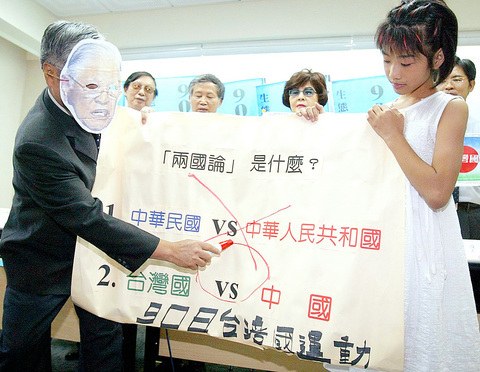Taiwan has been an independent state for 54 years and its title should be the Taiwan Republic, a pro-independence organization said yesterday.
"We are calling on the opposition parties not to embrace the thighs of [fawn over] China, and for the Democratic Progressive Party [DPP] government not to espouse the `Republic of China,'" said Peter Wang (王獻極), convener of the 908 Taiwan Republic Campaign.
Wang was speaking during a press conference marking the sixth anniversary of the "special state-to-state" dictum introduced by former president Lee Teng-hui (

PHOTO: WANG YIH-SUNG, TAIPEI TIMES
"The theory may be a small step for the former president, but it is a giant step for the Taiwan Republic and the two states refer to China and Taiwan Republic rather than China and Republic of China," Wang said. "We are dedicated to following in his footsteps and calling on the 23 million people of Taiwan to jointly accomplish the historic mission of changing the country's name to Taiwan."
Wang announced that his group would hold a flag-raising ceremony for the Taiwan Republic at 9am on Sept. 8 on Ketagelan Boulevard to celebrate the 54th anniversary of the inking of the San Francisco Peace Treaty to raise public awareness of the nation's identity.
"Taiwan became independent on Sept. 8, 1951, when 49 UN members signed the San Francisco Peace Treaty, in which the Japanese empire renounced its sovereignty over Taiwan after its defeat in World War II," Wang said. "The name of the country should be the Taiwan Republic and nothing else."
A candlelight gathering is planned for 7pm on the same day at Manka Park across from Lungshan Temple in Taipei City's Wanhua (萬華) District. Organizers hope to see a turnout of about 1,000 people at the flag-raising ceremony and 2,000 people at the evening event.
The group's short and long-term goals, Wang said, are to hold an inspection of the armed forces of the Taiwan Republic on Ketagelan Boulevard on the 55th anniversary of the peace accord next year and to see the president of the Taiwan Republic sign into law the Taiwan Republic Constitution on the day of his or her inauguration on May 20, 2008.
Among those supporting the group's goals are Presidential Office national policy adviser and lawyer Chuang Po-lin (莊柏林), DPP Legislator Wang To-far (王塗發) and campaign co-organizer Wang Li-tsu (王麗子).
Chuang said that China's "one-China" rhetoric has seriously jeopardized Taiwan's national interest and social security.
"Without extradition codes, we cannot bring back culprits committing hideous crimes here who elude the law by escaping overseas," he said. "With the `one-China' policy in place, China has been telling other countries to deal with them, not us, because they claim sovereignty over us."
Although Taiwan is already an independent, sovereign state, Wang To-far said that its biggest problem lies in the lack of a national identity.

INVESTIGATION: The case is the latest instance of a DPP figure being implicated in an espionage network accused of allegedly leaking information to Chinese intelligence Democratic Progressive Party (DPP) member Ho Jen-chieh (何仁傑) was detained and held incommunicado yesterday on suspicion of spying for China during his tenure as assistant to then-minister of foreign affairs Joseph Wu (吳釗燮). The Taipei District Prosecutors’ Office said Ho was implicated during its investigation into alleged spying activities by former Presidential Office consultant Wu Shang-yu (吳尚雨). Prosecutors said there is reason to believe Ho breached the National Security Act (國家安全法) by leaking classified Ministry of Foreign Affairs information to Chinese intelligence. Following interrogation, prosecutors petitioned the Taipei District Court to detain Ho, citing concerns over potential collusion or tampering of evidence. The

NEGOTIATIONS: Taiwan has good relations with Washington and the outlook for the negotiations looks promising, Minister of Economic Affairs J.W. Kuo said Taiwan’s GDP growth this year is expected to decrease by 0.43 to 1.61 percentage points due to the effects of US tariffs, National Development Council (NDC) Minister Paul Liu (劉鏡清) said at a meeting of the legislature’s Economics Committee in Taipei yesterday, citing a preliminary estimate by a private research institution. Taiwan’s economy would be significantly affected by the 32 percent “reciprocal” tariffs slapped by the US, which took effect yesterday, Liu said, adding that GDP growth could fall below 3 percent and potentially even dip below 2 percent to 1.53 percent this year. The council has commissioned another institution

NEGOTIATIONS: The US response to the countermeasures and plans Taiwan presented has been positive, including boosting procurement and investment, the president said Taiwan is included in the first group for trade negotiations with the US, President William Lai (賴清德) said yesterday, as he seeks to shield Taiwanese exporters from a 32 percent tariff. In Washington, US Trade Representative Jamieson Greer said in an interview on Fox News on Thursday that he would speak to his Taiwanese and Israeli counterparts yesterday about tariffs after holding a long discussion with the Vietnamese earlier. US President Donald Trump on Wednesday postponed punishing levies on multiple trade partners, including Taiwan, for three months after trillions of US dollars were wiped off global markets. He has maintained a 10 percent

TRADE: The premier pledged safeguards on ‘Made in Taiwan’ labeling, anti-dumping measures and stricter export controls to strengthen its position in trade talks Products labeled “made in Taiwan” must be genuinely made in Taiwan, Premier Cho Jung-tai (卓榮泰) said yesterday, vowing to enforce strict safeguards against “origin laundering” and initiate anti-dumping investigations to prevent China dumping its products in Taiwan. Cho made the remarks in a discussion session with representatives from industries in Kaohsiung. In response to the US government’s recent announcement of “reciprocal” tariffs on its trading partners, President William Lai (賴清德) and Cho last week began a series of consultations with industry leaders nationwide to gather feedback and address concerns. Taiwanese and US officials held a videoconference on Friday evening to discuss the